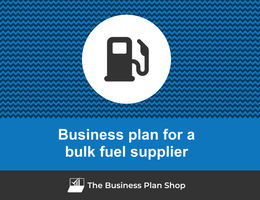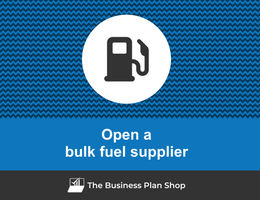How to create a financial forecast for a bulk fuel supplier?
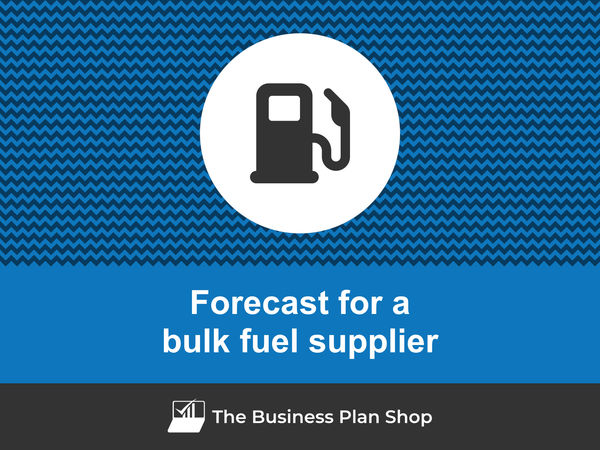
Creating a financial forecast for your bulk fuel supplier, and ensuring it stays up to date, is the only way to maintain visibility on future cash flows.
This might sound complex, but with the right guidance and tools, creating an accurate financial forecast for your bulk fuel supplier is not that hard.
In this guide, we'll cover everything from the main goal of a financial projection, the data you need as input, to the tables that compose it, and the tools that can help you build a forecast efficiently.
Without further ado, let us begin!
Why create and maintain a financial forecast for a bulk fuel supplier?
In order to prosper, your business needs to have visibility on what lies ahead and the right financial resources to grow. This is where having a financial forecast for your bulk fuel supplier becomes handy.
Creating a bulk fuel supplier financial forecast forces you to take stock of where your business stands and where you want it to go.
Once you have clarity on the destination, you will need to draw up a plan to get there and assess what it means in terms of future profitability and cash flows for your bulk fuel supplier.
Having this clear plan in place will give you the confidence needed to move forward with your business’s development.
Having an up-to-date financial forecast for a bulk fuel supplier is also useful if your trading environment worsens, as the forecast enables you to adjust to your new market conditions and anticipate any potential cash shortfall.
Finally, your bulk fuel supplier's financial projections will also help you secure financing, as banks and investors alike will want to see accurate projections before agreeing to finance your business.
Need a convincing business plan?
The Business Plan Shop makes it easy to create a financial forecast to assess the potential profitability of your projects, and write a business plan that’ll wow investors.

What information is used as input to build a bulk fuel supplier financial forecast?
A bulk fuel supplier's financial forecast is only as good as the inputs used to build it.
If you are creating (or updating) the forecast of an existing bulk fuel supplier, then you mostly need your accounting information, key historical operating non-financial data, and your team’s input on what to expect for the coming years.
If you are building financial projections for a bulk fuel supplier startup, you will need to have done your research and have a clear picture of your competitive environment and go-to-market strategy so that you can forecast sales accurately.
For a new venture, you will also need a precise list of the resources needed to keep the bulk fuel supplier running on a day-to-day basis and a list of the equipment and expenditures required to start the business (more on that later).
Let's now take a closer look at the elements that make up your bulk fuel supplier's financial forecast.
The sales forecast for a bulk fuel supplier
From experience, it usually makes sense to start your bulk fuel supplier's financial projection with the revenues forecast.
The inputs used to forecast your sales will include the historical trading data of your bulk fuel supplier (which can be used as a starting point for existing businesses) and the data collected in your market research (which both new ventures and existing businesses need to project their sales forward).
Your bulk fuel supplier's sales forecast can be broken down into two key estimates:
- The average price
- The number of monthly transactions
To assess these variables accurately, you will need to consider the following factors:
- Seasonal Demand: You may experience fluctuations in the number of monthly transactions based on seasonal demand for fuel. For example, during the winter months, there may be a higher demand for heating oil, while summer months may see an increase in gasoline sales for travel and outdoor activities.
- Competition: Your average price and number of monthly transactions may be affected by the level of competition in the market. If there are other bulk fuel suppliers in your area offering lower prices or better services, this may impact your sales.
- Fuel Prices: The average price of fuel can greatly impact your business. If the cost of fuel increases, you may need to adjust your prices accordingly, which could affect the number of monthly transactions. Additionally, fluctuations in fuel prices can also affect consumer behavior and their willingness to purchase fuel.
- Weather Conditions: Extreme weather conditions, such as hurricanes or snowstorms, can have a significant impact on your business. These events can disrupt fuel transportation and cause supply shortages, which may result in higher prices and a decrease in monthly transactions.
- Economic Conditions: The overall state of the economy can also affect your sales forecast. During times of economic downturn, consumers may cut back on non-essential purchases, which could result in a decrease in your number of monthly transactions. On the other hand, a strong economy may lead to increased consumer spending and a higher demand for fuel.
Once you have a sales forecast in place, the next step will be to work on your overhead budget. Let’s have a look at that now.
Need a convincing business plan?
The Business Plan Shop makes it easy to create a financial forecast to assess the potential profitability of your projects, and write a business plan that’ll wow investors.

The operating expenses for a bulk fuel supplier
The next step is to estimate the costs you’ll have to incur to operate your bulk fuel supplier.
These will vary based on where your business is located, and its overall size (level of sales, personnel, etc.).
But your bulk fuel supplier's operating expenses should normally include the following items:
- Staff Costs: This includes salaries, wages, and benefits for your employees, such as drivers and administrative staff.
- Vehicle Maintenance: As a bulk fuel supplier, you need to maintain a fleet of vehicles for delivering fuel to your customers. This includes regular maintenance, repairs, and fuel expenses for your vehicles.
- Fuel Inventory: You need to purchase and store a large amount of fuel to meet the demands of your customers. This expense includes the cost of purchasing fuel, as well as storage fees and any losses due to evaporation or leakage.
- Accountancy Fees: It is important to keep accurate financial records and file taxes properly for your bulk fuel supply business. This expense includes fees for hiring an accountant or using accounting software.
- Insurance Costs: As a bulk fuel supplier, you are exposed to potential risks and liabilities. This expense includes insurance premiums for protecting your business against accidents, damages, and other unforeseen events.
- Marketing and Advertising: To attract new customers and promote your business, you may need to invest in marketing and advertising activities, such as creating a website, printing marketing materials, or attending trade shows.
- Software Licenses: As a bulk fuel supplier, you may need to use specialized software for managing inventory, tracking deliveries, or processing payments. This expense includes the cost of purchasing or subscribing to such software.
- Rent and Utilities: If you operate from a physical location, you will have to pay rent and utilities, such as electricity, water, and internet, to keep your business running.
- Office Supplies: To run your business smoothly, you will need to purchase office supplies, such as paper, pens, printer ink, and other necessary items.
- Legal Fees: As a bulk fuel supplier, you may need to seek legal advice or services for drafting contracts, resolving disputes, or complying with regulations. This expense includes the fees for hiring a lawyer or using legal software.
- Banking Fees: To manage your business finances, you will need to pay various banking fees, such as transaction fees, wire transfer fees, and monthly account maintenance fees.
- Training and Development: As your business grows, you may need to invest in training and development programs for your employees to improve their skills and knowledge in the fuel supply industry.
- Taxes and Licenses: As a bulk fuel supplier, you will be subject to various taxes, such as income tax, sales tax, and fuel excise tax. This expense also includes the cost of obtaining necessary licenses and permits to operate your business.
- Equipment Rental: In addition to owning a fleet of vehicles, you may need to rent or lease other equipment, such as storage tanks, pumps, and meters, to support your fuel supply operations.
- Travel Expenses: If you need to travel for business purposes, such as meeting with clients or attending industry conferences, this expense includes the cost of transportation, accommodation, and meals.
This list is not exhaustive by any means, and will need to be tailored to your bulk fuel supplier's specific circumstances.
What investments are needed to start or grow a bulk fuel supplier?
Creating and expanding a bulk fuel supplier also requires investments which you need to factor into your financial forecast.
Capital expenditures and initial working capital items for a bulk fuel supplier could include elements such as:
- Fuel Tanks: As a bulk fuel supplier, one of your main capital expenditures will be purchasing and installing fuel tanks to store your products. These tanks come in various sizes and materials, and you will need to carefully consider your storage needs and budget when making this investment.
- Fuel Delivery Trucks: In order to transport your fuel from your storage tanks to your customers, you will need to invest in fuel delivery trucks. Depending on your business model and customer base, you may need to purchase multiple trucks to meet demand.
- Fuel Dispensers: As a bulk fuel supplier, you will likely have a physical location where customers can come and purchase fuel directly. This will require you to invest in fuel dispensers, which are used to pump the fuel into customer vehicles. These can range from simple pumps to more advanced systems with electronic payment options.
- Fuel Storage Facility: If you plan on expanding your business and storing large quantities of fuel, you may need to invest in a fuel storage facility. This could include a warehouse or storage yard, as well as equipment to safely transfer and store the fuel.
- Fuel Management Software: As your business grows, you may need to invest in fuel management software to help you track inventory, sales, and other financial data. This can help you make informed decisions and streamline your operations.
Again, this list is not exhaustive and will need to be adjusted according to the circumstances of your bulk fuel supplier.
Need a convincing business plan?
The Business Plan Shop makes it easy to create a financial forecast to assess the potential profitability of your projects, and write a business plan that’ll wow investors.

The financing plan of your bulk fuel supplier
The next step in the creation of your financial forecast for your bulk fuel supplier is to think about how you might finance your business.
You will have to assess how much capital will come from shareholders (equity) and how much can be secured through banks.
Bank loans will have to be modelled so that you can separate the interest expenses from the repayments of principal, and include all this data in your forecast.
Issuing share capital and obtaining a bank loan are two of the most common ways that entrepreneurs finance their businesses.
What tables compose the financial plan for a bulk fuel supplier?
Now let's have a look at the main output tables of your bulk fuel supplier's financial forecast.
The forecasted profit & loss statement
The profit & loss forecast gives you a clear picture of your business’ expected growth over the first three to five years, and whether it’s likely to be profitable or not.
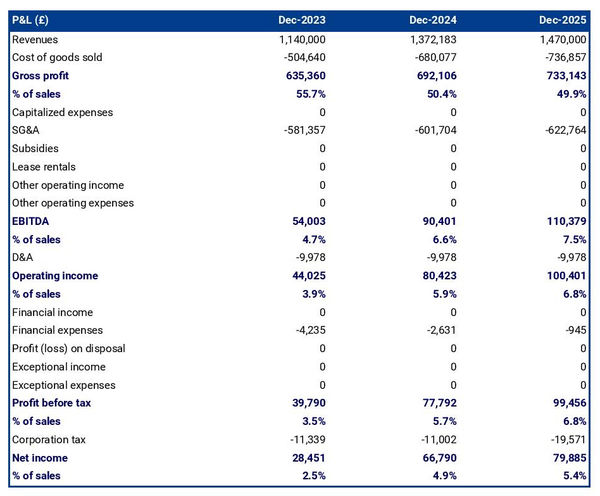
A healthy bulk fuel supplier's P&L statement should show:
- Sales growing at (minimum) or above (better) inflation
- Stable (minimum) or expanding (better) profit margins
- A healthy level of net profitability
This will of course depend on the stage of your business: numbers for an established bulk fuel supplier will look different than for a startup.
The projected balance sheet
Your bulk fuel supplier's projected balance sheet provides a snapshot of your business’s financial position at year-end.
It is composed of three types of elements: assets, liabilities and equity:
- Assets: represent what the business possesses including cash, equipment, and accounts receivable (money owed by clients).
- Liabilities: represent funds advanced to the business by lenders and other creditors. They include accounts payable (money owed to suppliers), taxes payable and loans from banks and financial institutions.
- Equity: is the combination of what has been invested by the business owners and the cumulative profits and losses generated by the business to date (which are called retained earnings). Equity is a proxy for the value of the owner's stake in the business.
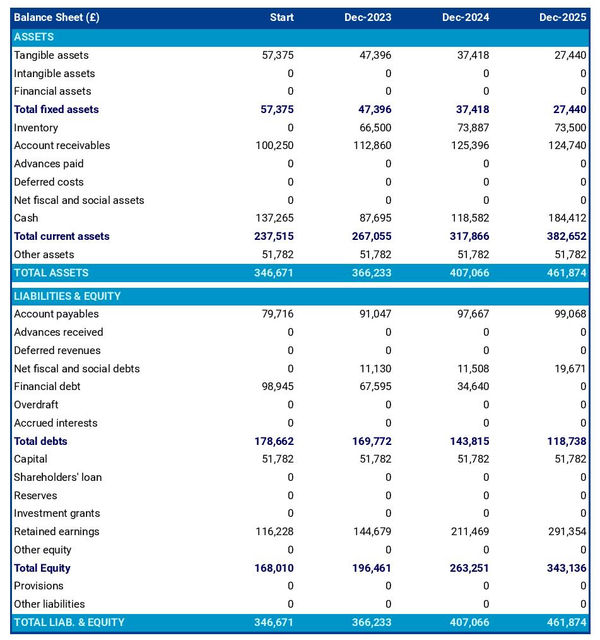
The cash flow forecast
Your bulk fuel supplier's cash flow forecast shows how much cash your business is expected to consume or generate in the years to come.
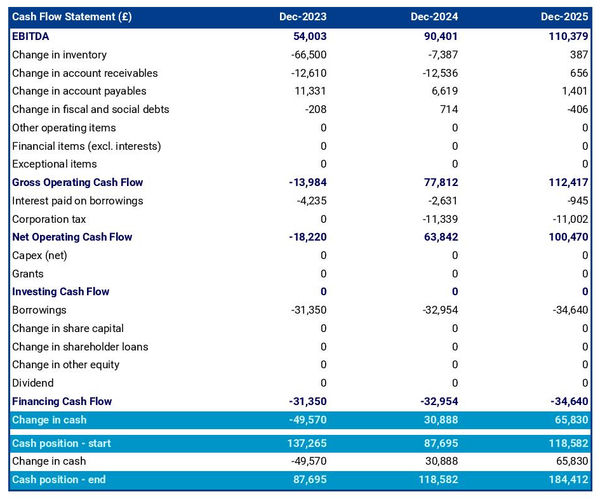
It is best practice to organise the cash flow forecast by nature to better explain where cash is used or generated by the bulk fuel supplier:
- Operating cash flow: shows how much cash is generated by the operating activities
- Investing cash flow: shows how much will be invested in capital expenditure to maintain or expand the business
- Financing cash flow: shows if the business is raising new capital or repaying financiers (debt repayment, dividends)
Keeping an eye on (and regularly updating) your bulk fuel supplier's cash flow forecast is key to ensuring that your business has sufficient liquidity to operate normally and to detect financing requirements as early as possible.
If you are trying to raise capital, you will normally be asked to provide a monthly cash flow forecast in your bulk fuel supplier's financial plan - so that banks or investors can assess seasonal variation and ensure your business is appropriately capitalised.
Need a convincing business plan?
The Business Plan Shop makes it easy to create a financial forecast to assess the potential profitability of your projects, and write a business plan that’ll wow investors.

Which tool should you use to create your bulk fuel supplier's financial projections?
Building a bulk fuel supplier financial forecast is not difficult provided that you use the right tool for the job. Let’s see what options are available below.
Using online financial forecasting software to build your bulk fuel supplier's projections
The modern and easiest way is to use an online financial forecasting tool such as the one we offer at The Business Plan Shop.
There are several advantages to using specialised software:
- You can easily create your financial forecast by letting the software take care of the financial calculations for you without errors
- You have access to complete financial forecast templates
- You get a complete financial forecast ready to be sent to your bank or investors
- You can easily track your actual financial performance against your financial forecast, and recalibrate your forecast as the year goes by
- You can create scenarios to stress test your forecast's main assumptions
- You can easily update your forecast as time goes by to maintain visibility on future cash flows
- You have a friendly support team on standby to assist you when you are stuck
- It’s cost-efficient and much cheaper than using an accountant or consultant (see below)
If you are interested in this type of solution, you can try our projection software for free by signing up here.
Calling in a financial consultant or chartered accountant
Enlisting the help of a consultant or accountant is also a good way to obtain a professional bulk fuel supplier financial forecast.
The downside of this solution is its cost. From experience, obtaining a simple financial forecast over three years (including a balance sheet, income statement, and cash flow statement) is likely to cost a minimum of £700 or $1,000.
The indicative cost above, is for a small business, and a forecast is done as a one-shot exercise. Using a consultant or accountant to track your actuals vs. forecast and to keep your financial projections up to date on a monthly or quarterly basis will cost a lot more.
If you opt for this solution, make sure your accountant has in-depth knowledge of your industry, so that they may challenge your figures and offer insights (as opposed to just taking your assumptions at face value to create the forecast).
Why not use a spreadsheet such as Excel or Google Sheets to build your bulk fuel supplier's financial forecast?
You and your financial partners need numbers you can trust. Unless you have studied finance or accounting, creating a trustworthy and error-free bulk fuel supplier financial forecast on a spreadsheet is likely to prove challenging.
Financial modelling is very technical by nature and requires a solid grasp of accounting principles to be done without errors. This means that using spreadsheet software like Excel or Google Sheets to create accurate financial forecasts is out of reach for most business owners.
Creating forecasts in Excel is also inefficient nowadays:
- Software has advanced to the point where forecasting can be done much faster and more accurately than manually on a spreadsheet.
- With artificial intelligence, the software is capable of detecting mistakes and helping decision-making.
Spreadsheets are versatile tools but they are not tailor-made for reporting. Importing your bulk fuel supplier's accounting data in Excel to track actual vs. forecast is incredibly manual and tedious (and so is keeping forecasts up to date). It is much faster to use dedicated financial planning tools like The Business Plan Shop which are built specially for this.
Need a convincing business plan?
The Business Plan Shop makes it easy to create a financial forecast to assess the potential profitability of your projects, and write a business plan that’ll wow investors.

Use our financial projection templates for inspiration
The Business Plan Shop has dozens of financial forecasting templates available.
Our examples contain both the financial forecast, and a written business plan which presents, in detail, the company, the team, the strategy, and the medium-term objectives.
Whether you are just starting out or already have your own bulk fuel supplier, looking at our template is always a good way to get ideas on how to model financial items and what to write when creating a business plan to secure funding.
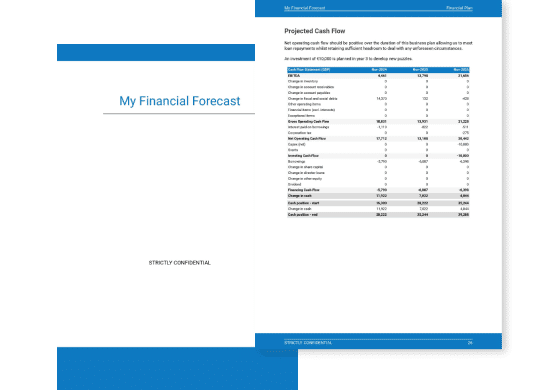
Takeaways
- Having a financial forecast enables you to visualise the expected growth, profitability, and cash generation for your business over the next three to five years.
- Tracking actuals vs. forecast and keeping your financial projections up-to-date is the only way to get a view on what your bulk fuel supplier future cash flows may look like.
- Using financial forecasting software is the mordern and easy way to create and maintain your forecasts.
This is the end of our guide on how to build the financial forecast for a bulk fuel supplier, we hope you found it useful. Don't hesitate to contact us if you want to share your feedback or have any questions.
Need a convincing business plan?
The Business Plan Shop makes it easy to create a financial forecast to assess the potential profitability of your projects, and write a business plan that’ll wow investors.

Also on The Business Plan Shop
- Example of financial forecast
- How to create a sales forecast for a business?
- Financial forecast template for a business idea
Know someone who owns or is thinking of starting a bulk fuel supplier? Share our forecasting guide with them!


